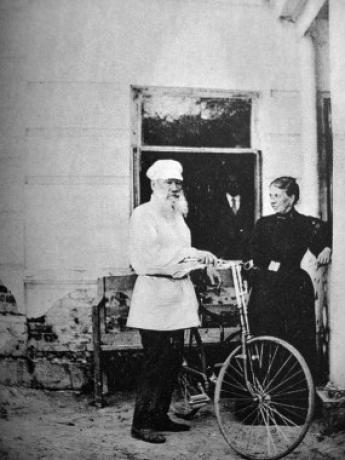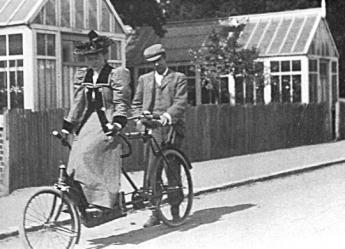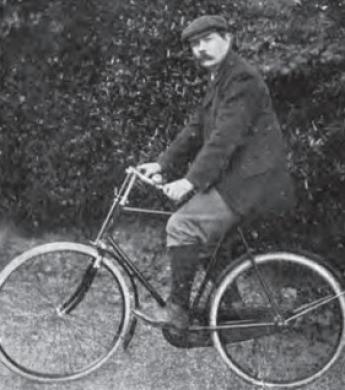Antiquarian Booksellers' Association Adrian Harrington Rare Books
Collecting Rare Books and First Editions - Allez Allez Allez!

By James Murray
How better to celebrate sports than by going over the close link historically between writers and bicycles.
Count Tolstoy
Leo Tolstoy was an early adopter, procuring a English Starley safety bicycle, which he learnt how to ride in his mid-sixties, undoubtedly to the surprise of the peasant workforce on his family estate at Yasnaya Polyana. Back in England H.G. Wells was a keen cyclist with the quote “When I see an adult on a bicycle I do not despair for the future of the human race” often attributed to him. He regularly managed to weave bicycles into his writings, perhaps most memorably in ‘The War in the Air’ with the novel’s hero Bert Smallways, who with his business partner Grubb, rented bicycles to the intrepid or the foolhardy as the following excerpt shows.
“The staple of their business was, however, the letting of bicycles on hire. It was a singular trade, obeying no known commercial or economic principles — indeed, no principles. There was a stock of ladies’ and gentlemen’s bicycles in a state of disrepair that passes description, and these, the hiring stock, were let to unexacting and reckless people, inexpert in the things of this world, at a nominal rate of one shilling for the first hour and sixpence per hour afterwards. But really there were no fixed prices, and insistent boys could get bicycles and the thrill of danger for an hour for so low a sum as threepence, provided they could convince Grubb that that was all they had. The saddle and handle-bar were then sketchily adjusted by Grubb, a deposit exacted, except in the case of familiar boys, the machine lubricated, and the adventurer started upon his career. Usually he or she came back, but at times, when the accident was serious, Bert or Grubb had to go out and fetch the machine home. Hire was always charged up to the hour of return to the shop and deducted from the deposit. It was rare that a bicycle started out from their hands in a state of pedantic efficiency.
Romantic possibilities of accident lurked in the worn thread of the screw that adjusted the saddle, in the precarious pedals, in the loose-knit chain, in the handle-bars, above all in the brakes and tyres. Tappings and clankings and strange rhythmic creakings awoke as the intrepid hirer pedalled out into the country. Then perhaps the bell would jam or a brake fail to act on a hill; or the seat-pillar would get loose, and the saddle drop three or four inches with a disconcerting bump; or the loose and rattling chain would jump the cogs of the chain-wheel as the machine ran downhill, and so bring the mechanism to an abrupt and disastrous stop without at the same time arresting the forward momentum of the rider; or a tyre would bang, or sigh quietly, and give up the struggle for efficiency.”
H. G. Wells
As on most subjects Arthur Conan Doyle treated bicycles with his trademark sound common sense stating that:
“When the spirits are low, when the day appears dark, when work becomes monotonous, when hope hardly seems worth having, just mount a bicycle and go out for a spin down the road, without thought on anything but the ride you are taking.”,
highlighting the bicycles’ ability to ease the stresses and strains of everyday life and rejuvenate the soul through the sheer unalloyed joy of cycling, the cares of the world slipping away as the miles tick by.
Sir Arthur Conan Doyle
At heart the connection between authors and bicycles is not at all surprising, the bicycle has always offered the freedom of self reliant movement and exploration, which is exactly what fiction writing is at it’s best. The best novelists let their imagination run free and attempt to escape the humdrum and quotidian reaching for the unfettered and the free. Happy pedalling to you all.
***
Posted on Adrian Harrington Books. A Literary Scellany, presented here by permission of the author and Adrian Harrington. Pictures: Adrian Harrington Books
Are you collecting books on bicycles?


